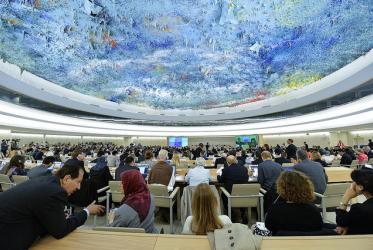Displaying 41 - 60 of 60
28 November 2016
New Executive Committee members elected in Trondheim
28 June 2016
Fleeing from – rather than to – a place
10 February 2016
WCC calls for an end to foreign military interventions in Syria
12 October 2015
WCC urges responsibility for and support to the refugees in Europe
04 September 2015
Religious leaders urge a ban on fully autonomous weapons
02 April 2015
WCC, 유엔인권이사회에 이라크의 종교 소수민 공동체들에 대한 지원 요청
02 September 2014
Consultation brings rights of religious minorities into focus
18 September 2013










